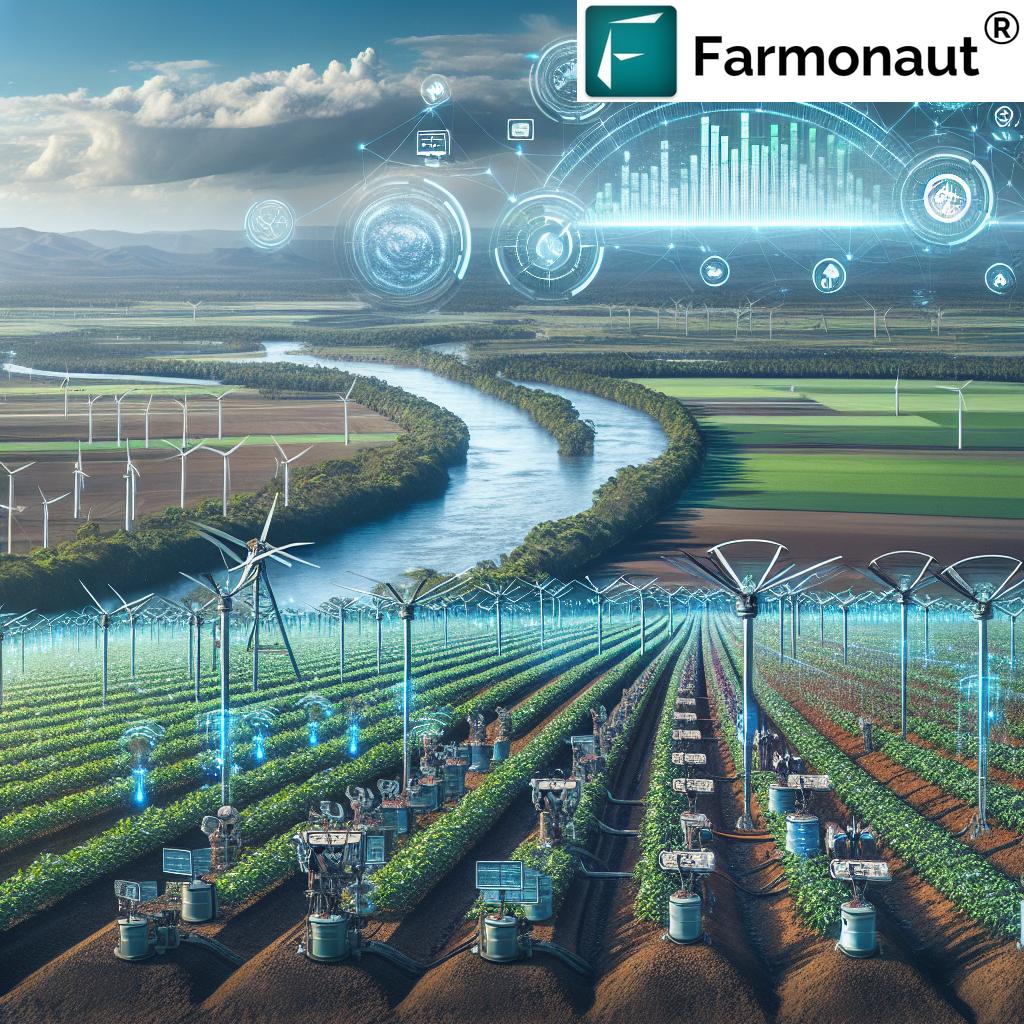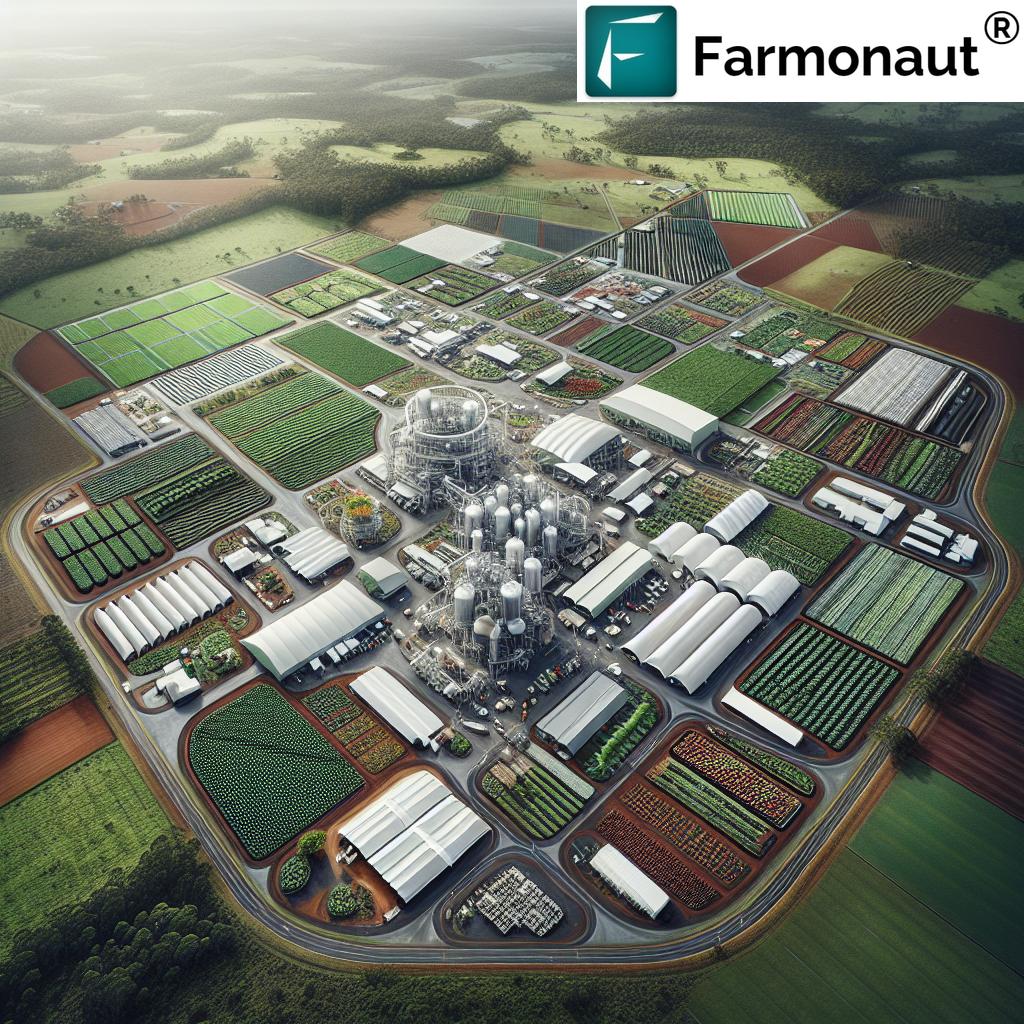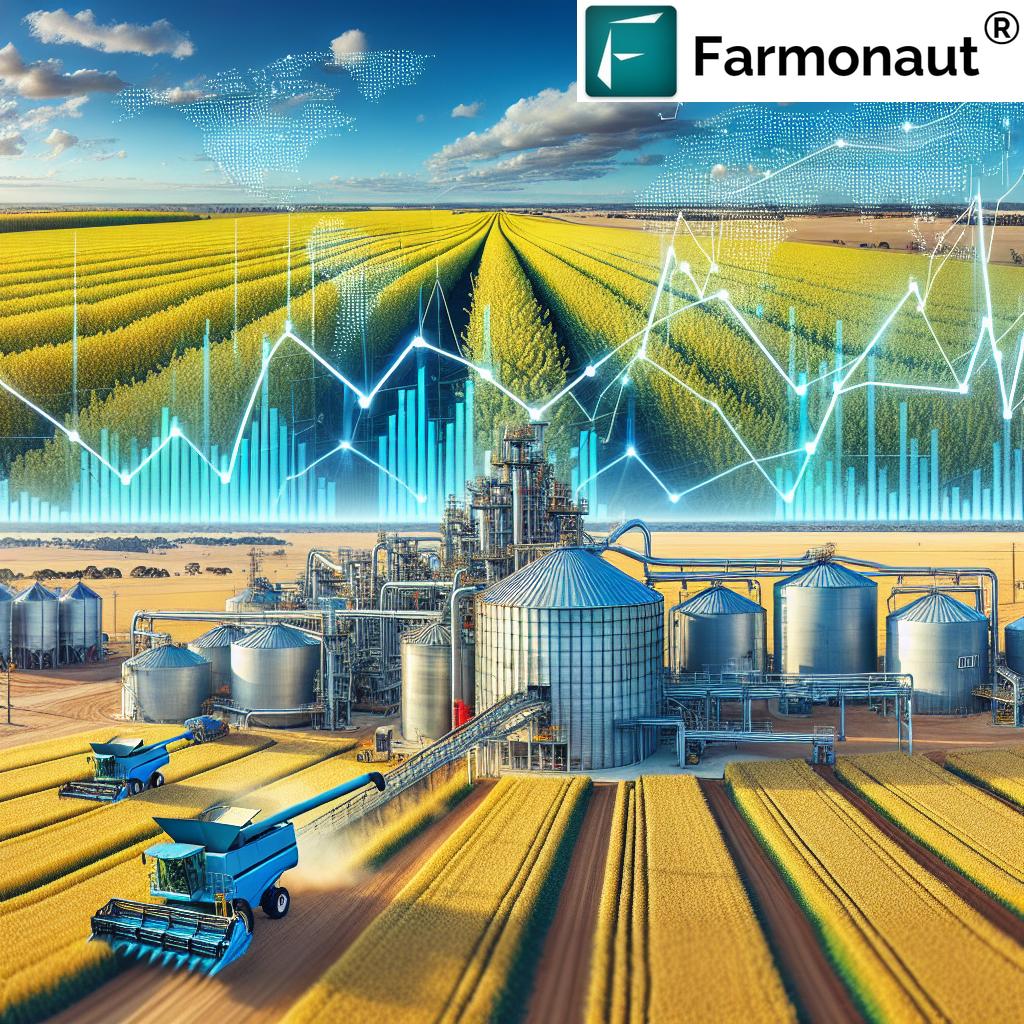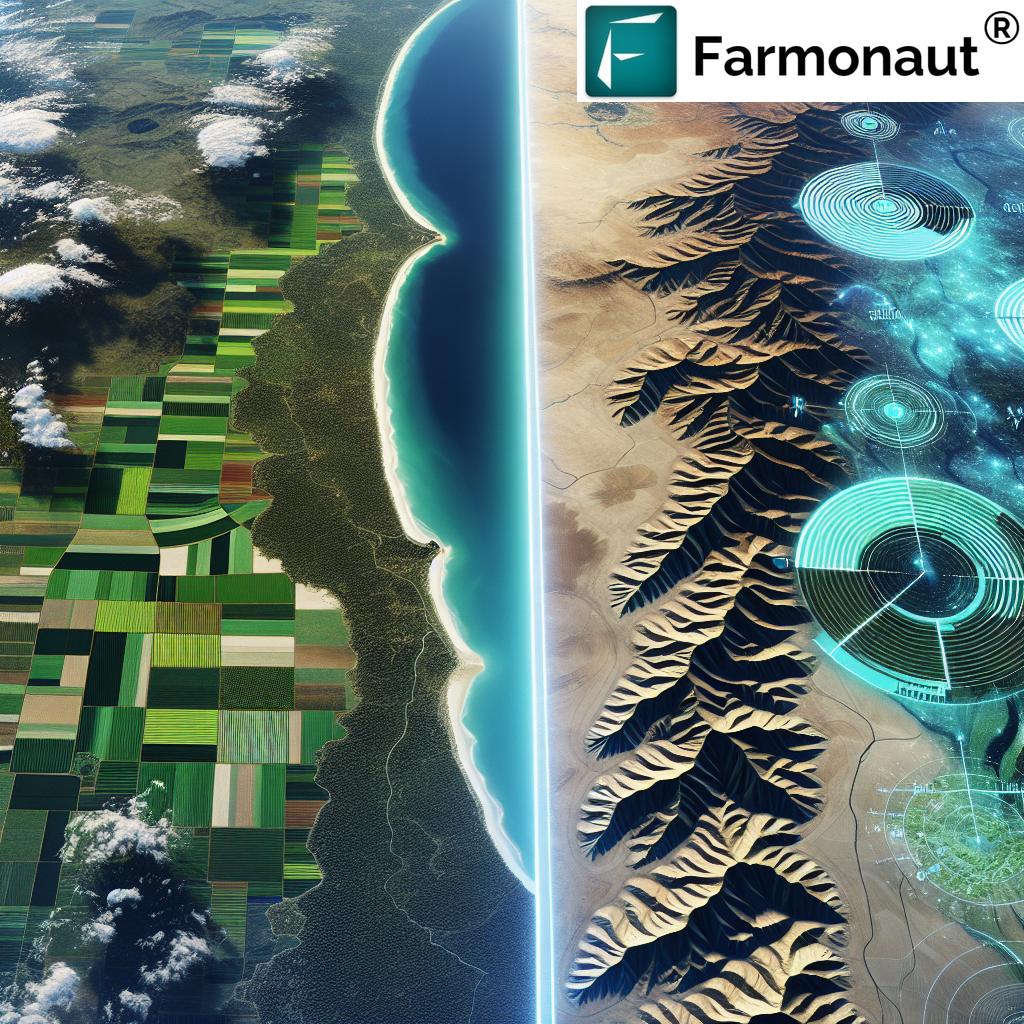Revolutionizing Queensland’s Agricultural Value Chains: Farmonaut’s Innovative Agtech Solutions for Rural Economic Development
“Queensland’s agricultural value chains are leveraging over 10 different agtech solutions to revolutionize traditional farming methods.”
In the heartland of Queensland, a quiet revolution is taking place. The agricultural landscape is undergoing a profound transformation, driven by innovative value chains and cutting-edge technology. As we delve into this exciting realm of rural economic development, we’ll explore how market-driven agriculture and sustainable farming practices are reshaping the future of Queensland’s agricultural sector.
The Dawn of a New Agricultural Era in Queensland
Queensland’s agricultural industry has long been a cornerstone of the state’s economy. However, in recent years, we’ve witnessed a significant shift towards more innovative and sustainable practices. This transformation is not just about adopting new technologies; it’s about reimagining entire agricultural value chains to foster rural economic development.
At the forefront of this revolution are agtech solutions that are fundamentally changing how we approach farming. From smart irrigation systems in the Boyne River region to drought-resistant crop varieties in remote arid areas, innovation is taking root across the state. These advancements are not only boosting productivity but also enhancing the resilience of rural communities in the face of environmental challenges.
Market-Driven Agriculture: The Key to Sustainable Growth
One of the most significant shifts we’re seeing is the move towards market-driven agriculture. This approach aligns agricultural production with evolving consumer demands and global market trends. By focusing on what the market wants, Queensland farmers are finding new opportunities for growth and diversification.
- Increased focus on high-value crops
- Development of niche markets for specialty products
- Greater emphasis on quality and traceability
- Adoption of sustainable farming practices to meet consumer preferences
This market-driven approach is not just benefiting large-scale operations. Small and medium-sized farms are also finding opportunities to thrive by targeting specific market segments and leveraging digital platforms to reach consumers directly.
The Role of Agtech in Transforming Agricultural Value Chains
Agtech solutions are playing a pivotal role in revolutionizing Queensland’s agricultural sector. These innovative technologies are helping farmers optimize their operations, reduce waste, and improve overall efficiency. Let’s explore some of the key areas where agtech is making a significant impact:
Precision Agriculture
Precision agriculture technologies are transforming the way farmers manage their crops. By using satellite imagery, sensors, and GPS technology, farmers can now make data-driven decisions about planting, irrigation, and harvesting. This level of precision not only improves yields but also reduces the environmental impact of farming practices.
Farmonaut’s advanced remote sensing tools are at the forefront of this precision agriculture revolution. Our satellite-based crop health monitoring system provides farmers with real-time insights into vegetation health, soil moisture levels, and other critical metrics. This data empowers farmers to make informed decisions about resource allocation, ultimately optimizing crop yields and reducing waste.

Smart Irrigation Systems
Water scarcity is a significant challenge in many parts of Queensland. Smart irrigation systems are helping farmers use this precious resource more efficiently. These systems use soil moisture sensors, weather data, and AI algorithms to optimize irrigation schedules, ensuring crops receive the right amount of water at the right time.
In the Boyne River region, for example, smart irrigation technologies have led to significant water savings while maintaining or even improving crop yields. This not only benefits individual farmers but also contributes to the overall sustainability of the region’s water resources.
Blockchain for Supply Chain Transparency
Blockchain technology is revolutionizing supply chain management in agriculture. By providing an immutable record of each step in the production and distribution process, blockchain enhances transparency and traceability. This is particularly important for Queensland’s export-oriented agricultural sectors, such as beef and horticulture.
Farmonaut’s blockchain-based traceability solution is helping to build trust and reduce fraud in agricultural supply chains. By ensuring that every stage of a product’s journey from farm to consumer is transparent and secure, we’re helping Queensland producers meet the growing demand for traceable and sustainable food products.
Sustainable Farming Practices: A Path to Long-Term Prosperity
Sustainability is no longer just a buzzword; it’s a necessity for the future of agriculture in Queensland. Farmers across the state are adopting practices that not only protect the environment but also improve long-term productivity and resilience.
- Conservation tillage to reduce soil erosion
- Crop rotation to improve soil health and reduce pest pressure
- Integrated pest management to minimize chemical use
- Agroforestry to diversify income streams and enhance biodiversity
These sustainable practices are not only good for the environment; they’re also good for business. Consumers are increasingly willing to pay a premium for sustainably produced food, creating new market opportunities for Queensland farmers.
Optimizing Agricultural Supply Chains
Efficient supply chains are crucial for the success of Queensland’s agricultural sector. Digital innovations are helping to streamline these supply chains, reducing waste and improving profitability.
Digital Platforms for Direct Marketing
Digital platforms are enabling farmers to bypass traditional middlemen and sell directly to consumers or retailers. This not only increases farmers’ profit margins but also allows them to build direct relationships with their customers.
IoT-Enabled Logistics
Internet of Things (IoT) devices are being used to track shipments in real-time, monitor storage conditions, and optimize transportation routes. This level of control and visibility helps reduce food waste and ensures that products reach consumers in the best possible condition.
Predictive Analytics for Demand Forecasting
Advanced analytics tools are helping farmers and distributors better predict market demand. This allows for more efficient production planning and reduces the risk of oversupply or shortages.
“Farmonaut’s remote sensing tools contribute to at least 3 case studies showcasing the power of value chain analysis in Queensland’s agriculture.”
Enhancing Rural Community Resilience
The innovations in agricultural value chains are having a profound impact on rural communities across Queensland. By creating new economic opportunities and improving the sustainability of farming operations, these innovations are helping to build more resilient rural economies.
- Diversification of income streams
- Creation of new jobs in agtech and related sectors
- Improved access to markets for small-scale producers
- Enhanced food security through more efficient production and distribution
Moreover, the adoption of digital technologies is helping to bridge the urban-rural divide. Improved connectivity and access to online resources are opening up new educational and business opportunities for rural residents.

The Power of Value Chain Analysis
Value chain analysis is proving to be a powerful tool for identifying new market opportunities and promoting food and fiber product development in Queensland. By examining each step of the production and distribution process, farmers and agribusinesses can identify areas for improvement and innovation.
Identifying Inefficiencies
Value chain analysis helps identify bottlenecks and inefficiencies in the production and distribution process. By addressing these issues, farmers can reduce costs and improve overall productivity.
Discovering New Market Opportunities
Through value chain analysis, producers can identify gaps in the market and opportunities for new products or services. This is particularly important in a rapidly changing global marketplace.
Enhancing Product Quality
By understanding each step of the value chain, producers can implement quality control measures to ensure their products meet or exceed market expectations.
Cutting-Edge Research Initiatives
Queensland’s agricultural sector is benefiting from a range of cutting-edge research initiatives aimed at aligning agricultural production with evolving consumer demands and global market trends. These research efforts are crucial for maintaining the state’s competitive edge in the global marketplace.
Drought-Resistant Crop Development
Researchers are working on developing new crop varieties that can thrive in Queensland’s often harsh and unpredictable climate. These drought-resistant crops could be a game-changer for farmers in arid regions.
Sustainable Livestock Management
Research into sustainable livestock management practices is helping Queensland’s beef industry reduce its environmental footprint while improving productivity. This includes work on improved grazing systems and feed efficiency.
Biotech Solutions for Pest Management
Biotechnology research is leading to new, environmentally friendly solutions for pest and disease management. These innovations could reduce the need for chemical pesticides, benefiting both farmers and the environment.
Farmonaut’s Contribution to Queensland’s Agricultural Innovation
At Farmonaut, we’re proud to be part of Queensland’s agricultural revolution. Our advanced remote sensing tools are helping farmers across the state optimize their operations and make data-driven decisions.
- Real-time crop health monitoring
- AI-based advisory systems for personalized farm management
- Blockchain-based traceability solutions
- Carbon footprint tracking for sustainable farming
By providing affordable and accessible precision agriculture solutions, we’re helping to level the playing field for farmers of all sizes. Our technologies are particularly valuable in remote and arid regions, where traditional farming methods face significant challenges.
Ready to revolutionize your farming practices? Try Farmonaut today!
For developers interested in integrating our technology into their own solutions, check out our API and API Developer Docs.
Queensland Agricultural Value Chain Innovations
| Region | Innovation Type | Estimated Economic Impact (1-10) | Sustainability Score (A-F) | Farmonaut Integration Potential |
|---|---|---|---|---|
| Boyne River | Smart Irrigation Systems | 8 | A | High |
| Remote Arid Areas | Drought-Resistant Crop Varieties | 7 | B | Medium |
| Coastal Farmlands | Precision Agriculture Technologies | 9 | A | High |
| Central Queensland | Blockchain-based Supply Chain Management | 8 | B | High |
| South East Queensland | Vertical Farming | 6 | A | Medium |
The Future of Agriculture in Queensland
As we look to the future, it’s clear that the agricultural sector in Queensland is on the cusp of a new era. The innovations we’ve discussed are just the beginning. We anticipate seeing even more advanced technologies and practices emerge in the coming years.
- Increased use of AI and machine learning in farm management
- Further development of vertical farming and urban agriculture
- Greater integration of renewable energy in farming operations
- Expansion of precision agriculture techniques to more farms
These advancements will not only boost productivity and sustainability but also create new job opportunities in rural areas, helping to revitalize rural economies.
Conclusion: A Bright Future for Queensland’s Agricultural Value Chains
The revolution in Queensland’s agricultural value chains is well underway. From innovative farming practices to cutting-edge technologies, the sector is evolving to meet the challenges of the 21st century. By embracing market-driven agriculture, sustainable practices, and digital innovations, Queensland’s farmers are not just securing their own futures but also contributing to the economic development of rural communities across the state.
At Farmonaut, we’re excited to be part of this transformation. Our innovative agtech solutions are helping farmers across Queensland optimize their operations, reduce their environmental impact, and tap into new market opportunities. As we continue to develop and refine our technologies, we look forward to playing an even greater role in shaping the future of agriculture in Queensland and beyond.
The journey towards a more innovative, sustainable, and prosperous agricultural sector is ongoing. But with the right tools, technologies, and mindset, Queensland’s farmers are well-positioned to lead the way into a bright and bountiful future.
Frequently Asked Questions
- What is agricultural value chain innovation?
Agricultural value chain innovation refers to the process of introducing new technologies, practices, or business models to improve the efficiency, productivity, and sustainability of the entire agricultural production and distribution system. - How is Farmonaut contributing to Queensland’s agricultural innovation?
Farmonaut provides advanced remote sensing tools and AI-driven insights that help farmers optimize their operations, monitor crop health in real-time, and make data-driven decisions. Our technologies are particularly valuable for precision agriculture and sustainable farming practices. - What are some examples of agtech solutions being used in Queensland?
Some examples include smart irrigation systems, precision agriculture technologies, blockchain-based supply chain management, and drought-resistant crop varieties. Farmonaut’s satellite-based crop monitoring and AI advisory systems are also being utilized by Queensland farmers. - How does market-driven agriculture benefit rural communities?
Market-driven agriculture aligns production with consumer demands, creating new opportunities for farmers to tap into high-value markets. This can lead to increased profitability, job creation, and overall economic development in rural areas. - What role does sustainability play in Queensland’s agricultural future?
Sustainability is crucial for the long-term viability of Queensland’s agricultural sector. Sustainable practices help conserve resources, reduce environmental impact, and meet growing consumer demand for eco-friendly products. They also contribute to the resilience of rural communities in the face of climate change and other challenges.
We hope this comprehensive overview has provided valuable insights into the exciting developments taking place in Queensland’s agricultural sector. As we continue to innovate and adapt, the future looks bright for rural economic development and sustainable farming practices across the state.
















